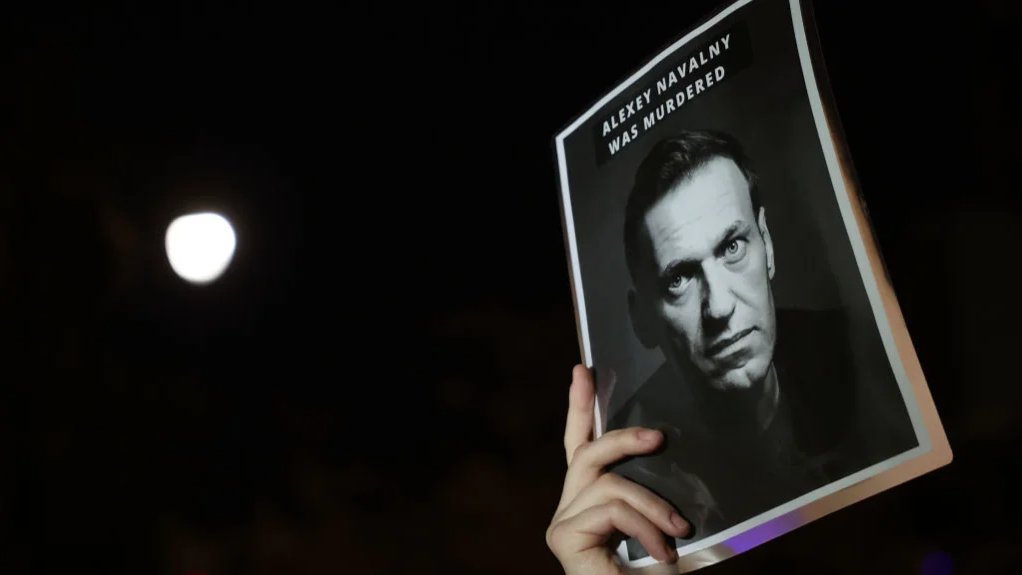The circumstances around the sudden death of Russian opposition leader Alexey Navalny continued to remain unclear on Monday, four days after the news of his killing in an Arctic penal colony was announced.
As Navalny’s widow Yulia announced her intention to carry on her late husband’s work in an extraordinarily passionate video message, the Russian authorities were accused of frustrating attempts by Navalny’s family and lawyers to access or even locate his body.
The following are the latest developments as of Monday afternoon.
Yulia Navalnaya enters the fray
Yulia Navalnaya posted a video message on her murdered husband’s official YouTube channel announcing her intention to continue his work, assuring the world that “the struggle for a free Russia will not stop”.
“Putin did not just kill Alexey Navalny the man. Alongside him, he wanted to kill our hopes, our freedom and our future,” Navalnaya said in the nine-minute video. She also spoke of her husband’s unwavering positivity and unshakeable belief in a brighter future for Russia even as he was subjected to the most inhumane conditions by the prison authorities.
“My husband could not be broken, and that’s exactly why Putin killed him — like a coward, not daring to look him in the eye or even say his name,” Navalnaya said, before saying that she would soon reveal the identities of his murderers.
Footage of Navalny’s transfer to Salekhard emerges
Independent news outlet Mediazona posted a video on Sunday evening appearing to show a convoy of Russian prison vehicles transferring Navalny’s body to Salekhard.
The footage confirmed what sources told Novaya Gazeta Europe on Saturday: that Navalny’s body was initially taken to a morgue in the city of Labytnangi on Friday, before being transferred to the city of Salekhard some 20 kilometres away later that night.
Navalny’s mother, Lyudmila Navalnaya, was told that her son’s body had been transported to the morgue in Salekhard. However, when Navalnaya and her lawyers arrived there on Monday morning, they were refused entry and staff would not even say if Navalny’s body was on the premises.
Navalny’s press secretary Kira Yarmysh said that the authorities were “lying and doing everything they can to avoid handing over the body”.
Over 60,000 request Navalny’s body be returned to family
The Russian Investigative Committee has been flooded with over 60,000 individual requests for Navalny’s family to be given access to his body since Saturday evening.
The action, initiated by human rights group OVD-Info, comes amid accusations that the authorities were trying to conceal the true cause of Navalny’s death and were attempting to buy themselves some time by creating bureaucratic obstacles for his mourning relatives.
Kremlin spokesperson Dmitry Peskov stressed that the fate of Navalny’s body was being dealt with by the relevant authorities and had nothing to do with the Presidential Administration.
At least 389 arrested in memorial actions across Russia
Russian police arrested over 389 people in 39 cities across Russia at the weekend as mourners paid tribute to Navalny, OVD-Info reported.
The largest number of detentions was recorded in St. Petersburg, where over 90 people have been arrested, fined or sentenced to community service since Friday. Local media reported that police in the city used tasers and batons against those who came to lay flowers at a makeshift memorial to Navalny in the city centre.
Footage from reporters in Moscow also showed mourners being dragged away through the snow by police as they paid tribute to Navalny, with several charged with “disobeying police orders”.
The authorities employed various measures in efforts to obstruct tributes being made to Navalny.
In Novosibirsk, a city centre memorial to the victims of political repression was cordoned off all weekend by police, while authorities in Tomsk handed out leaflets warning mourners of the “inadmissibility of antisocial behaviour” as they laid flowers at an ad hoc memorial to Navalny.
Russian map applications delete Navalny tributes
Popular map services 2GIS and Yandex Maps began blocking reviews of certain monuments in Russian cities after users across the country started using them to pay virtual tribute to Navalny.
Monuments to victims of Soviet political repression in cities across Russia have become focal points for tributes to Navalny. Due to the danger of protest in Russia, many people chose to share their feelings by leaving reviews of the monuments on 2GIS and Yandex Maps rather than risk arrest for laying flowers at a memorial in person.
2GIS returned an error message when users tried to leave reviews of monuments to victims of political repression in Novosibirsk, Krasnoyarsk, Chelyabinsk and Omsk, while SOTA reported that another user’s attempt to publish a review of a memorial in St. Petersburg was rejected by Yandex Maps.
The anti-corruption Telegram channel VChK-OGPU also published what it said was a list of Navalny-related hashtags Russia’s media regulator Roskomnadzor intended to ban from Russian websites.
International fallout to death continues
In Brussels, Yulia Navalnaya met with European Council President Charles Michel shortly after her video message was released on Monday.
Sending his condolences to Yulia Navalnaya, EU Foreign Minister Josep Borrell said that both Putin and his regime would “be held accountable for the death of Alexey Navalny” and repeated Navalnaya’s line that “Putin is not Russia. Russia is not Putin.” He later also proposed renaming the EU global sanctions regime after Navalny.
“Putin is a monster,” said Marina Litvinenko, the wife of murdered former FSB agent Alexander Litvinenko, in an interview with Sky News on Monday. She also spoke of her concerns for the safety of the remaining opposition figures in the country and of her anger at Putin for killing “the most prominent politician and the hope of a new Russia”.
Kremlin spokesperson Dmitry Peskov said it was “completely unacceptable” that Western leaders had been making “obnoxious statements” about Navalny’s death before the investigation was complete.

